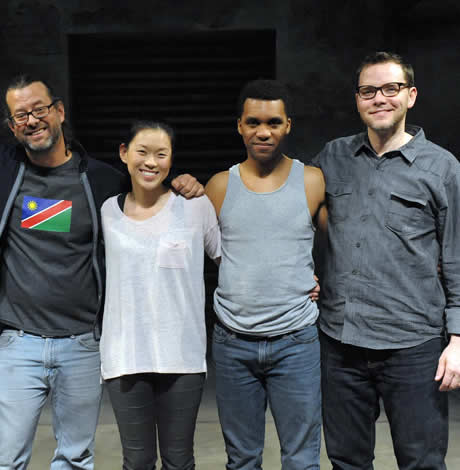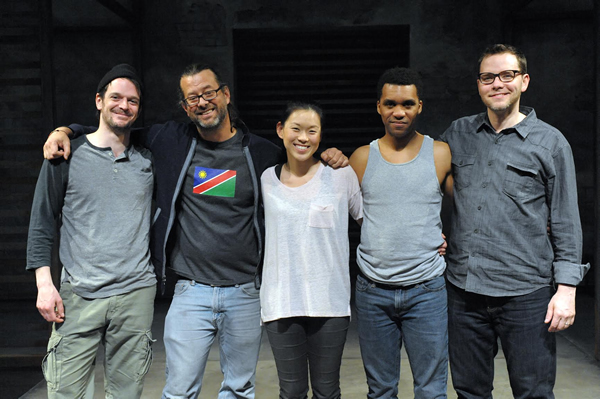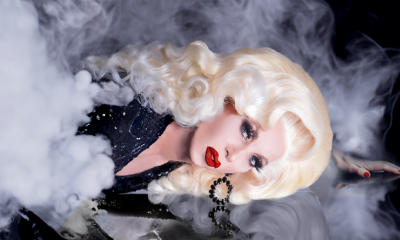Theater
‘Lights Rise’ for budding playwright
Straight writer explores gay themes in love triangle drama


Chad Beckim, right, with the cast of ‘Lights Rise on Grace.’ From left are Ryan Barry, Michael John Garces, Jeena Yi and DeLance Minefee. (Photo courtesy Woolly Mammoth)
‘Lights Rise on Grace’
Through April 26
Woolly Mammoth Theatre Company
641 D Street, N.W.
$35-68
202-393-3939
Playwright Chad Beckim dreads the poseur label. In his work, he writes about the personal lives of minorities and down-low lovers. Things a straight white boy from Maine might not know about. But through firsthand experience and research, Beckim has learned a lot and does his best to get it right.
In his gritty chamber play “Lights Rise on Grace,” now at Woolly Mammoth, Beckim tells the story of Grace, a shy Asian girl, who falls in love with Large, an extroverted African-American classmate. But their happiness is interrupted when Large is sent to prison. While locked up, he falls into a relationship with white inmate Riece. Six years later, a released Large reunites with Grace but continues his relationship with Riece.
“Inside prison Large and Riece are definitely lovers — intensely physically and emotionally paired off. When they return to their outside lives they don’t cut that off. They still see each other. And from what I’ve read, this happens a lot,” says Beckim, 41. “Had they grown up in a different more supportive environment, Large and Riece would have been gay men in a same-sex relationship, I think.”
What’s Beckim’s way into these gay characters? “I’m in theater. I’m surrounded by gay people and have always frank discussions with them. Also my uncle is gay.”
The Brooklyn-based playwright and co-artistic director of Partial Comfort Productions, a small but respected New York theater company recalls a particular family vacation. “My uncle and I were out on the lake drinking boxed wine when I asked him about being gay, to tell me what it’s like. That following Christmas when I came home from New York, my mom said, ‘If you’re gay I’ll always love.’ I was confused because I had a serious girlfriend at the time. Turns out my uncle had told my mom that I seemed gay curious and might be afraid to come out. My brother laughed a lot.”
Despite his familiarity with gays, treading in LGBT territory continues to be where Beckim feels the most “interloper-esque.” “When writing, I persistently ask questions to my gay friends: Does this track? Does this pan out? I don’t enter into this lightly, believe me. I take it very seriously and want to get it right.”
“Grace” first ran at the New York International Fringe Festival in 2007 where it was singled out for top prizes, and the revised Woolly production is part of a National New Play Network rolling premiere. This version is the result of a major rewrite (40 out of 51 pages rewritten). It’s directed by Michael John Garcés and features DeLance Minefee as Large, Ryan Barry as Riece and Jeena Yi in the title part.
Beckim’s inspiration for “Grace” was Dael Orlandersmith’s “Yellowman,” a two hander examination of race and sexuality “I read it on a 6 a.m. bus ride home to Maine and was blown away,” he says. “I’m from the whitest state in the country but I’ve always been interested in culture, race, ethnicity and sexuality. I think growing up where everyone looks the same fueled my interest and desire to examine other cultures.”
As an undergrad at Syracuse University where he did a lot of theater, Beckim pledged a black frat. After college, he continued acting and moved New York City where he lived with a Dominican friend’s extended family in rough, pre-gentrified Washington Heights. When he taught in New York City public schools as a teaching artist, his students were mostly minorities. His mentor is celebrated African-American gay playwright Robert O’Hara (“Bootycandy”) who encouraged Beckim to become a serious writer and introduced him to Woolly Mammoth.
For a time he lived in a housing project in Spanish Harlem where “Grace” is set. He remembers walking by a family-run Chinese restaurant where the young daughter was always seated in the window doing her homework, and wondering what her life would be. How would she get along with the black and Spanish kids at school? What kind of life she’d have. That’s where the play started.”
Now focused on writing, Beckim is eager to continue exploring subjects meaningful to him and the varied people to which he’s drawn. There’s nothing poseur about him.
Theater
Magic is happening for Round House’s out stage manager
Carrie Edick talks long hours, intricacies of ‘Nothing Up My Sleeve’

‘Nothing Up My Sleeve’
Through March 15
Round House Theatre
4545 East-West Highway
Bethesda, Md. 20814
Tickets start at $50
Roundhousetheatre.org
Magic is happening for out stage manager Carrie Edick.
Working on Round House Theatre’s production of “Nothing Up My Sleeve,” Edick quickly learned the ways of magicians, their tricks, and all about the code of honor among those who are privy to their secrets.
The trick-filled, one-man show starring master illusionist Dendy and staged by celebrated director Aaron Posner, is part exciting magic act and part deeply personal journey. The new work promises “captivating storytelling, audience interaction, jaw-dropping tricks, and mind-bending surprises.”
Early in rehearsals, there was talk of signing a non-disclosure agreement (NDA) for production assistants. It didn’t happen, and it wasn’t necessary, explains Edick, 26. “By not having an NDA, Dendy shows a lot of trust in us, and that makes me want to keep the secrets even more.
“Magic is Dendy’s livelihood. He’s sharing a lot and trusting a lot; in return we do the best we can to support him and a large part of that includes keeping his secrets.”
As a production assistant (think assistant stage manager), Edick strives to make things move as smoothly as possible. While she acknowledges perfection is impossible and theater is about storytelling, her pursuit of exactness involves countless checklists and triple checks, again and again. Six day weeks and long hours are common. Stage managers are the first to arrive and last to leave.
This season has been a lot about learning, adds Edick. With “The Inheritance” at Round House (a 22-week long contract), she learned how to do a show in rep which meant changing from Part One to Part Two very quickly; “In Clay” at Signature Theatre introduced her to pottery; and now with “Nothing Up My Sleeve,” she’s undergoing a crash course in magic.
She compares her career to a never-ending education: “Stage managers possess a broad skillset and that makes us that much more malleable and ready to attack the next project. With some productions it hurts my heart a little bit to let it go, but usually I’m ready for something new.”
For Edick, theater is community. (Growing up in Maryland, she was a shy kid whose parents signed her up for theater classes.) Now that community is the DMV theater scene and she considers Round House her artistic home. It’s where she works in different capacities, and it’s the venue in which she and actor/playwright Olivia Luzquinos chose to be married in 2024.
Edick came out in middle school around the time of her bat mitzvah. It’s also around the same time she began stage managing. Throughout high school she was the resident stage manager for student productions, and also successfully participated in county and statewide stage management competitions which led to a scholarship at the University of Maryland, Baltimore County (UMBC) where she focused on technical theater studies.
Edick has always been clear about what she wants. At an early age she mapped out a theater trajectory. Her first professional gig was “Tuesdays with Morrie” at Theatre J in 2021. She’s worked consistently ever since.
Stage managing pays the bills but her resume also includes directing and intimacy choreography (a creative and technical process for creating physical and emotional intimacy on stage). She names Pulitzer Prize winning lesbian playwright Paula Vogel among her favorite artists, and places intimacy choreographing Vogel’s “How I learned to Drive” high on the artistic bucket list.
“To me that play is heightened art that has to do with a lot of triggering content that can be made very beautiful while being built to make you feel uncomfortable; it’s what I love about theater.”
For now, “Nothing Up My Sleeve” keeps Edick more than busy: “For one magic trick, we have to set up 100 needles.”
Ultimately, she says “For stage managers, the show should stay the same each night. What changes are audiences and the energy they bring.”
Theater
‘Octet’ explores the depths of digital addiction
Habits not easily shaken in Studio Theatre chamber musical

‘Octet’
Through Feb. 26
Studio Theatre
1501 14th Street, N.W.
Tickets start at $55
Studiotheatre.org
David Malloy’s “Octet” delves deep into the depths of digital addiction.
Featuring a person ensemble, this extraordinary a capella chamber musical explores the lives of recovering internet addicts whose lives have been devastated by digital dependency; sharing what’s happened and how things have changed.
Dressed in casual street clothes, the “Friends of Saul” trickle into a church all-purpose room, check their cell phones in a basket, put away the bingo tables, and arrange folding chairs into a circle. Some may stop by a side table offering cookies, tea, and coffee before taking a seat.
The show opens with “The Forest,” a haunting hymn harking back to the good old days of an analog existence before glowing screens, incessant pings and texts.
“The forest was beautiful/ My head was clean and clear/Alone without fear/ The forest was safe/ I danced like a beautiful fool / One time some time.”
Mimicking an actual step meeting, there’s a preamble. And then the honest sharing begins, complete with accounts of sober time and slips.
Eager to share, Jessica (Chelsea Williams) painfully recalls being cancelled after the video of her public meltdown went viral. Henry (Angelo Harrington II) is a gay gamer with a Candy Crush problem. Toby (Adrian Joyce) a nihilist who needs to stay off the internet sings “So anyway/ I’m doing good/ Mostly/ Limiting my time/ Mostly.”
The group’s unseen founder Saul is absent, per usual.
In his stead Paula, a welcoming woman played with quiet compassion by Tracy Lynn Olivera, leads. She and her husband no longer connect. They bring screens to bed. In a love-lost ballad, she explains: “We don’t sleep well/ My husband I/ Our circadian rhythms corrupted/ By the sallow blue glow of a screen/ Sucking souls and melatonin/ All of my dreams have been stolen.”
After too much time spent arguing with strangers on the internet, Marvin, a brainy young father played by David Toshiro Crane, encounters the voice of a God.
Ed (Jimmy Kieffer) deals with a porn addiction. Karly (Ana Marcu) avoids dating apps, a compulsion compared to her mother’s addiction to slot machines.
Malloy, who not only wrote the music but also the smart lyrics, book, and inventive vocal arrangements, brilliantly joins isolation with live harmony. It’s really something.
And helmed by David Muse, “Octet” is a precisely, quietly, yet powerfully staged production, featuring a topnotch cast who (when not taking their moment in the spotlight) use their voices to make sounds and act as a sort of Greek chorus. Mostly on stage throughout all of the 100-minute one act, they demonstrate impressive stamina and concentration.
An immersive production, “Octet” invites audience members to feel a part of the meeting. Studio’s Shargai Theatre is configured, for the first, in the round. And like the characters, patrons must also unplug. Everyone is required to have their phones locked in a small pouch (that only ushers are able to open and close), so be prepared for a wee bit of separation anxiety.
At the end of the meeting, the group surrenders somnambulantly. They know they are powerless against internet addiction. But group newbie Velma (Amelia Aguilar) isn’t entirely convinced. She remembers the good tech times.
In a bittersweet moment, she shares of an online friendship with “a girl in Sainte Marie / Just like me.”
Habits aren’t easily shaken.
Theater
Out dancer on Alvin Ailey’s stint at Warner Theatre
10-day production marks kickoff of national tour

Alvin Ailey American Dance Theater
Through Feb. 8
Warner Theatre
513 12th St., N.W.
Tickets start at $75
ailey.org
The legendary Alvin Ailey American Dance Theater is coming to Washington’s Warner Theatre, and one of its principal veterans couldn’t be more pleased. Out dancer Renaldo Maurice is eager to be a part of the company’s 10-day stint, the kickoff of a national tour that extends through early May.
“I love the respectful D.C. crowd and they love us,” says Maurice, a member of esteemed modern dance company for 15 years. The traveling tour is made of two programs and different casting with Ailey’s masterwork “Revelations” in both programs.
Recently, we caught up with Maurice via phone. He called from one of the quiet rooms in his New York City gym where he’s getting his body ready for the long Ailey tour.
Based in North Newark, N.J., where he recently bought a house, Maurice looks forward to being on the road: “I enjoy the rigorous performance schedule, classes, shows, gym, and travel. It’s all part of carving out a lane for myself and my future and what that looks like.”
Raised by a single mother of three in Gary, Ind., Maurice, 33, first saw Alvin Ailey as a young kid in the Auditorium Theatre in downtown Chicago, the same venue where he’s performed with the company as a professional dancer.
He credits his mother with his success: “She’s a real dance mom. I would not be the man or artist I am today if it weren’t for the grooming and discipline of my mom. Support and encouragement. It’s impacted my artistry and my adulthood.”
Maurice is also part of the New York Ballroom scene, an African-American and Latin underground LGBTQ+ subculture where ball attendees “walk” in a variety of categories (like “realness,” “fashion,” and “sex siren”) for big prizes. He’s known as the Legendary Overall Father of the Haus of Alpha Omega.
WASHINGTON BLADE: Like many gay men of his era, Ailey lived a largely closeted public life before his death from AIDS-related complications in 1989.
RENALDO MAURICE Not unusual for a Black gay man born during the Depression in Rogers, Texas, who’s striving to break out in the industry to be a creative. You want to be respected and heard. Black man, and Black man who dances, and you may be same-sex gender loving too. It was a lot, especially at that time.
BLADE: Ailey has been described as intellectual, humble, and graceful. He possessed strength. He knew who he was and what stories he wanted to tell.
MAURICE: Definitely, he wanted to concentrate on sharing and telling stories. What kept him going was his art. Ailey wanted dancers to live their lives and express that experience on stage. That way people in the audience could connect with them. It’s incredibly powerful that you can touch people by moving your body.
That’s partly what’s so special about “Revelations,” his longest running ballet and a fan favorite that’s part of the upcoming tour. Choreographed by Alvin Ailey in 1960, it’s a modern dance work that honors African-American cultural heritage through themes of grief, joy, and faith.
BLADE: Is “Revelation” a meaningful piece for you?
MAURICE: It’s my favorite piece. I saw it as a kid and now perform it as a professional dance artist. I’ve grown into the role since I was 20 years old.
BLADE: How can a dancer in a prestigious company also be a ballroom house father?
MAURICE: I’ve made it work. I learned how to navigate and separate. I’m a principal dancer with Ailey. And I take that seriously. But I’m also a house father and I take that seriously as well.
I’m about positivity, unity, and hard work. In ballroom you compete and if you’re not good, you can get chopped. You got to work on your craft and come back harder. It’s the same with dance.
BLADE: Any message for queer audiences?
MAURICE: I know my queer brothers and sisters love to leave with something good. If you come to any Ailey performance you’ll be touched, your spirit will be uplifted. There’s laughter, thoughtful and tender moments. And it’s all delivered by artists who are passionate about what they do.
BLADE: Alvin Ailey has been a huge part of your life. Thoughts on that?
MAURICE: I’m a believer in it takes a village. Hard work and discipline. I take it seriously and I love what I do. Ailey has provided me with a lot: world travel, a livelihood, and working with talented people here and internationally. Alvin Ailey has been a huge part of my life from boyhood to now. It’s been great.
-

 Baltimore4 days ago
Baltimore4 days ago‘Heated Rivalry’ fandom exposes LGBTQ divide in Baltimore
-

 Real Estate4 days ago
Real Estate4 days agoHome is where the heart is
-

 District of Columbia4 days ago
District of Columbia4 days agoDeon Jones speaks about D.C. Department of Corrections bias lawsuit settlement
-

 European Union4 days ago
European Union4 days agoEuropean Parliament resolution backs ‘full recognition of trans women as women’




















